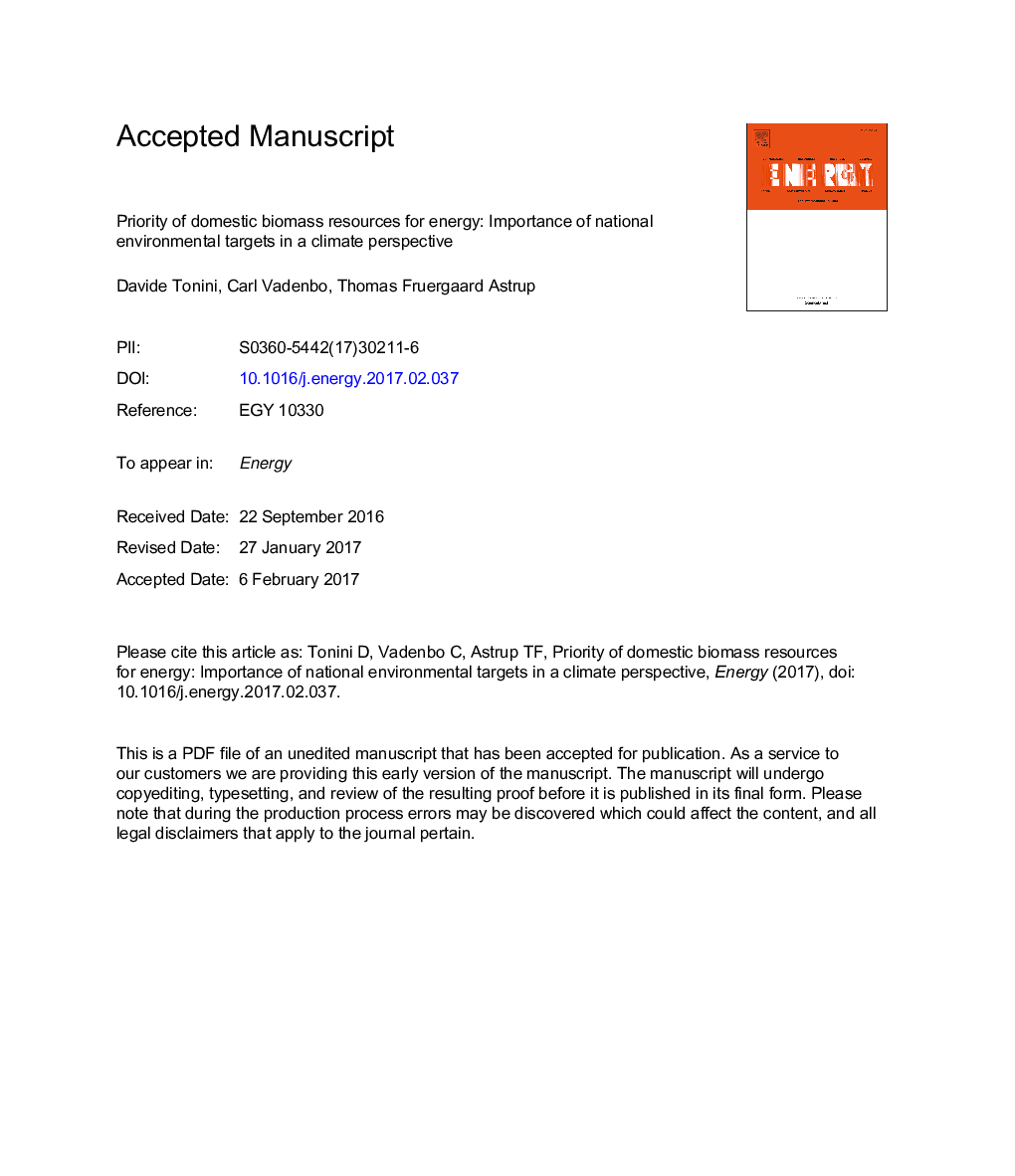| کد مقاله | کد نشریه | سال انتشار | مقاله انگلیسی | نسخه تمام متن |
|---|---|---|---|---|
| 5475963 | 1521427 | 2017 | 52 صفحه PDF | دانلود رایگان |
عنوان انگلیسی مقاله ISI
Priority of domestic biomass resources for energy: Importance of national environmental targets in a climate perspective
ترجمه فارسی عنوان
اولویت منابع داخلی زیست توده برای انرژی: اهمیت اهداف زیست محیطی ملی در منظر محیطی
دانلود مقاله + سفارش ترجمه
دانلود مقاله ISI انگلیسی
رایگان برای ایرانیان
کلمات کلیدی
GHGESAOFMSWDAPLUCENSMSWAGRCHPSSFWUrea-NiLUC - IluciaConsequential LCA - LCA مربوطهLCA - ارزیابی چرخه حیاتLifecycle assessment - ارزیابی چرخه حیاتRenewable energy - انرژی تجدیدپذیرEnergy Sector - بخش انرژیAgricultural sector - بخش کشاورزیOptimization - بهينه سازيEnergy system analysis - تجزیه و تحلیل سیستم انرژیIndirect land-use change - تغییر غیر مستقیم زمین استفادهLand-use change - تغییر کاربری زمینdiammonium phosphate - دی آمونیوم فسفاتMunicipal solid waste - زباله جامد شهریBioenergy - زیستانرژیEmission factor - فاکتور انتشارdry matter - ماده خشکWaste management - مدیریت پسماند یا مدیریت زبالهwet weight - وزن مرطوبManure - کودNatural gas - گاز طبیعی Greenhouse gas - گاز گلخانه ایGlobal warming - گرم شدن زمین یا گرمایش زمین
ترجمه چکیده
استفاده بهینه از زیست توده از منظر کاهش گرمایش جهانی بستگی به عوامل متعدد، از جمله رقابت برای زمین و سایر محدودیت ها. هدف از این مطالعه شناسایی استفاده بهینه از منابع داخلی زیست توده برای دانمارک با اهداف کمینه کردن سهم گرمایش جهانی و مصرف منابع انرژی فسیلی است. برای این منظور، ارزیابی چرخه زندگی مرتبط با گزینه های مختلف برای زیست توده انجام شد. راه حل های بهینه با استفاده از اهداف زیست محیطی ملی، با استفاده از برنامه نویسی خطی شناسایی شد. نتایج نشان داد که استفاده از پتانسیل انرژی کود و کاه نشان دهنده فرصت اولیه برای کاهش بیشتر گرمایش جهانی است. برای این منظور، هم هضم (برای کود) و احتراق با تولید گرما و قدرت (برای کاه) به عنوان فن آوری های امیدوار کننده به نظر می رسد. استفاده از زیست توده (یا بیوگاز) برای برق / گرما به طور کلی ترجیح داده می شود، در حالی که زغال سنگ / روغن هنوز در سیستم انرژی استفاده می شود. با این حال، برای تحقق اهداف زیست محیطی برای انرژی های تجدید پذیر در بخش حمل و نقل، انحراف سهم قابل توجهی از بیوگاز (و / یا سایر سوخت های زیستی) از این استفاده مفید تر ضروری است. برای حذف کامل زغال سنگ / نفت، باید از توزیع زیست توده اضافی (به منابع داخلی فعلی) یا از طریق تولید محصولات زراعی انرژی داخلی یا واردات زیست توده / سوخت زیستی استفاده شود؛ به طور متناوب، می توان از گاز طبیعی استفاده کرد.
موضوعات مرتبط
مهندسی و علوم پایه
مهندسی انرژی
انرژی (عمومی)
چکیده انگلیسی
The optimal use of biomass from a global warming mitigation perspective depends upon numerous factors, including competition for land and other constraints. The goal of this study is identifying optimal uses of domestic biomass resources for the case of Denmark, with the objectives of minimizing global warming contribution and fossil energy resource consumption. For this purpose, consequential life cycle assessment of the different options for biomass was performed. Optimal solutions were identified, given specific national environmental targets, using linear programming. Results highlighted that utilizing the energy potential of manure and straw represents the primary opportunity for further global warming mitigation. For this purpose, co-digestion (for manure) and combustion with heat-and-power production (for straw) appear as the most promising technologies. The utilization of biomass (or biogas) for electricity/heat is generally preferred, as long as coal/oil is still used within the energy system. Yet, to fulfill environmental targets for renewable energy in the transport sector, the diversion of a significant share of biogas (and/or other biofuels) from these more beneficial uses is necessary. To completely phase out coal/oil, additional biomass (to current domestic resources) must be included, either through domestic energy crops cultivation or biomass/biofuel import; alternatively, natural gas could be used.
ناشر
Database: Elsevier - ScienceDirect (ساینس دایرکت)
Journal: Energy - Volume 124, 1 April 2017, Pages 295-309
Journal: Energy - Volume 124, 1 April 2017, Pages 295-309
نویسندگان
Davide Tonini, Carl Vadenbo, Thomas Fruergaard Astrup,
